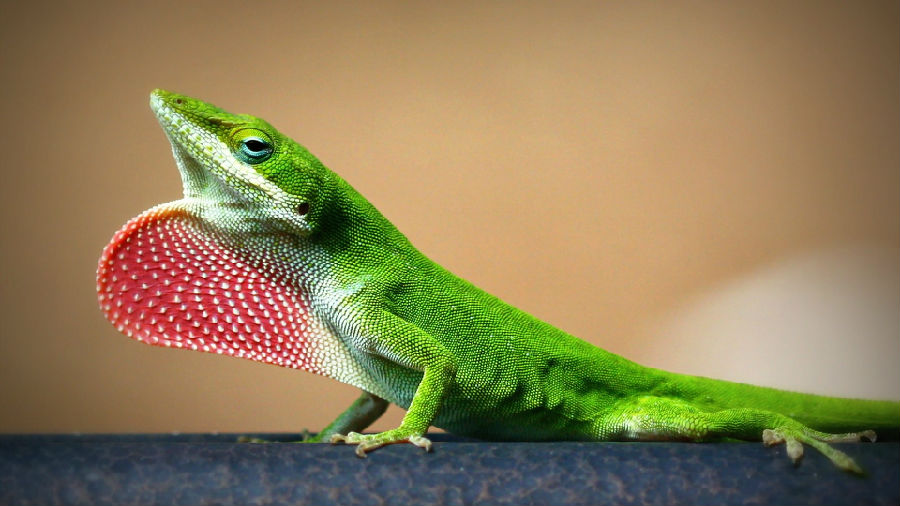(单词翻译:单击)
听力文本
This is Scientific American — 60-Second Science. I'm Christopher Intagliata.
In January 2014, an epic cold wave swept across the southeast—a "snowpocalypse" so severe that thousands of drivers in Atlanta abandoned their cars on icy highways and Interstates.
"And I'm from the south, I was raised in South Carolina, and I can tell you that in the South we do not do cold—at all."
Shane Campbell-Staton was watching it all unfold from Harvard, where he was getting his PhD. He'd just wrapped up his last field season in Texas, studying the green anole lizard. And as he was scanning photos of the storm, he came across something unexpected: a photo that included his research subject.
"There was this one picture of a green anole that was upside down, dead in the snow. And it was sort of a Eureka moment. And I thought to myself, well maybe I should go back out and see if these populations I'd been studying, if they showed any sort of response to this pretty extreme weather event in the south."
And so that's what he did. Because here's the bit of serendipity: he'd actually been studying the cold tolerance of different populations of these lizards. And the cold snap had just delivered the perfect experiment—a chance to see natural selection in action.
"So I went back in April right after these winter storms had subsided. And I noticed that in the south, the southernmost population, the survivors of the storm were able to maintain function at significantly colder temperatures than the population before the storm. And this ability to maintain function at colder temperatures is something we typically see much farther north."

He did genetic analyses too: and found that the genes switched on in the surviving southern lizards overlapped with genes more typically turned on in their cold-hardy northern cousins. And the survivors also carried variations in their DNA that more closely matched northern lizards. So three things: cold tolerance, gene expression, and even the gene variants the southerners carried, suggested this winter storm had indeed caused selection on the southern lizards. The analysis is in the journal Science.
Campbell-Staton, now at the University of Illinois and the University of Montana, is quick to mention that this isn't quite evolution yet. It's just one generation—he hasn't yet seen these traits passed down to another set of lizards. That's his next investigation.
As for whether this is a good thing, the fact that some lizards were able to summon the ability to survive cold? "The answer is both yes and no potentially." Yes, because if another cold wave rolls through, the surviving southern population will be better prepared—more cold-tolerant.
But: "We know that selection comes at a cost. Which is death. So the individuals that died during this particular winter event may have had genetic variants that would have allowed them to survive a heat wave, or a drought, or some other extreme event. And now those lineages are essentially gone."
The long term forecast for the 21st century includes more of these extreme events—and more severe ones at that. So species that lose their genetic Swiss army knife of adaptive tools may, again, be left out in the cold.
Thanks for listening for Scientific American — 60-Second Science Science. I'm Christopher Intagliata.
参考译文
这里是科学美国人——60秒科学。我是克里斯托弗·因塔利亚塔。
2014年1月,一场惊人的巨大寒潮席卷了美国东南部地区,这场“末日暴雪”极其严重,以致于亚特兰大数千名司机将汽车扔在了结冰的高速公路和州际公路上,弃车而去。
“我来自美国南部,在南卡罗来纳州长大,我可以告诉你们,在南方我们一点儿都不冷。”
尚恩·坎贝尔·史塔顿在哈佛大学见证了这一切,当时他正在哈佛攻读博士学位。尚恩刚刚结束了在得克萨斯州进行的野外考察,他研究的是绿色变色龙蜥蜴。他在浏览那场风暴的照片时,偶然发现了意想不到的状况:一张包含他研究课题的照片。
“那张照片中有一只绿色变色龙腹部朝上、死在了雪地里。那一刻我灵光一现。我想或许我应该回去看看我一直在研究的这些生物,看看它们对这次南方极端天气事件有何反应。”
然后他就那样做了。因为这等于机缘凑巧:实际上他一直在研究不同种群蜥蜴的耐寒性。而这场寒潮相当于进行了一次完美的实验——观察正在发生的自然选择的机会。
“因此,4月份冬季风暴平息以后,我马上就回去了。我注意到,在南部最南端,经历风暴后幸存下来的蜥蜴种群能在温度极低的环境下维持正常功能,比风暴前更耐寒。而这种在更低温度下维持功能的能力是极北部生物的特征。”
他还进行了基因分析:他发现,幸存下来的南方蜥蜴所表现出来的基因,与它们的北方耐寒亲戚所表现出来的基因相一致。而且,幸存下来的南方蜥蜴还携带着变异DNA,这种DNA与北方蜥蜴的基因更为匹配。因此,耐寒性、基因表达、甚至是南方蜥蜴携带的基因变体,这三点说明这场冬季风暴确实使南方蜥蜴产生了自然选择。这项分析报告发表在《科学》期刊上。
目前在伊利诺伊大学和蒙大拿大学就职的坎贝尔·史塔顿很快就指出,这还不是完全进化。这只是一代蜥蜴身上发生的变化,他还没有看到这些特征遗传给下一代蜥蜴。而这将是他下一个研究项目。
那某些蜥蜴拥有能召唤这种能力来抵御寒冷,这是不是一件好事?“可能是,也可能不是。”是好事的原因是,如果再发生一次寒潮侵袭,幸存下来的南方蜥蜴会进行更充分的准备,增强耐寒能力。
但是:“我们知道这种选择要付出代价,代价就是死亡。因此,在这次事件中死亡的蜥蜴,可能携带能使它们抵抗热浪、干旱或其它极端事件的基因变体。但是现在这些血脉基本断绝了。”
21世纪的长期天气预报不仅包括这些极端事件,还包括更为严重的事件。因此,那些失去了基因中“万能”适应工具的物种,可能会再次被冷落。
谢谢大家收听科学美国人——60秒科学。我是克里斯托弗·因塔利亚塔。
译文为可可英语翻译,未经授权请勿转载!
重点讲解
重点讲解:
1. wrap up 圆满完成,圆满结束(工作、协议等);
例句:Things will wrap up when everybody's ready for that to happen.
当我们都准备好了时候,事情就该了结了。
2. come across 偶然发现;偶然遇见;
例句:This is one of the easiest problems I have ever come across.
这是我遇到过的最容易的问题之一。
3. pass down 传递;传下去;
例句:Folk music has been passed down from one generation to another.
民间音乐是一代一代地流传下来的。
4. be left out in the cold 被忽视;受冷落;
例句:Developing countries might be left out in the cold in current world trade talks.
在目前的世界贸易洽谈中,发展中国家可能会受到冷落。


